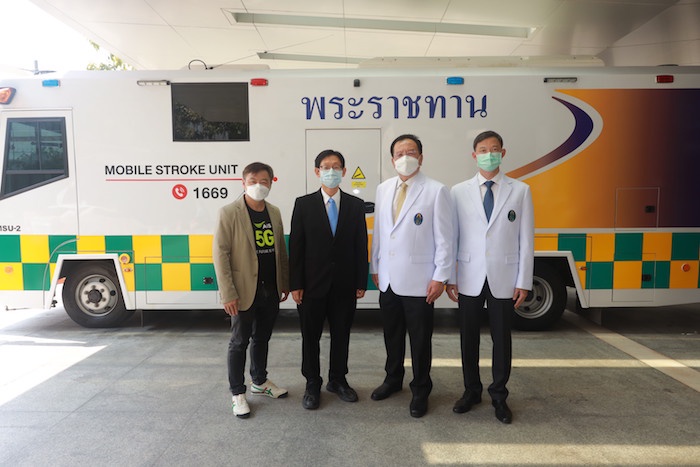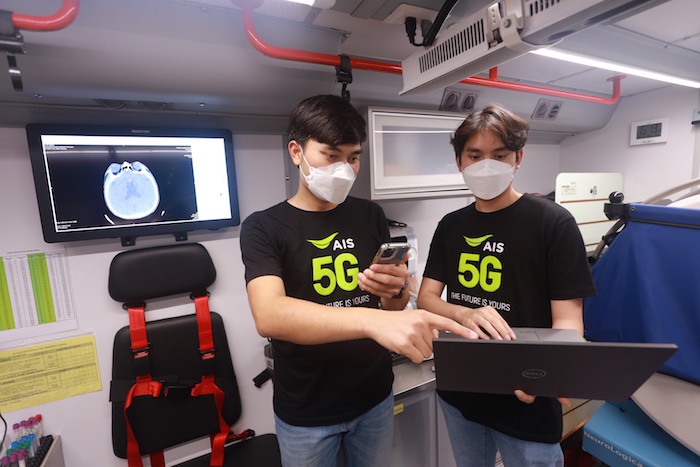Wasit Wattanasap, Head of Nationwide Operation and Support Department at AIS, added, "AIS' long-standing goal over many years, with investments of 30-35 billion baht, is to roll out the smart 5G network as digital infrastructure with the capability to upgrade the work of various sectors. For public health, we have continually developed digital services and solutions to support the work of medical personnel in various aspects. This includes working with the Faculty of Medicine at Siriraj Hospital and the Faculty of Engineering at Mahidol University to jointly develop the Mobile Stroke Unit, a specialized ambulance with the capability to assist stroke victims with first aid."
AIS partnered the team to develop equipment in the vehicle to work more efficiently, while spreading the 5G CPE signal which supports rapid response to emergency signals. It boosted signal quality to display images from cameras inside the vehicle, and even CT scans, which must be urgently sent to the Cloud for the medical team to evaluate the severity of symptoms, or apply first aid in a timely manner.
The group has extended the success of the Mobile Stroke Unit to remote areas nationwide such as Somdet Pra Yuparaj Jom Beung Hospital, Ratchaburi, Kiriratnikom Hospital, Surat Thani, Somdet Pra Yuparaj Chiang Khong Hospital, Chiang Rai and Somdet Pra Yuparaj That Phanom Hospital, Nakhon Phanom.
Assoc. Prof. Yongchai Nilanont, President of Siriraj Stroke Center, noted, "Stroke is a leading course of death and disability. Data shows that last year, there were over 13.7 million stroke victims worldwide. The critical factor for treatment of stroke is time standards. That is, the sooner the symptoms are discovered, the quicker the diagnosis is made for correct treatment, which leads to better rates of recovery. This is why we need new technology as a tool for medical personnel.
"Today, the Mobile Stroke Unit has treated over 700 patients and has proven that it can save the lives of stroke patients. The Mobile Stroke Unit can to diagnose patients from the moment they enter the Unit by sending the results of a CT scan to specialist doctors who provide treatment through a monitor displaying clear images of the patient in the Unit. Doctors can recommend treatments which match the severity of the symptoms in a timely manner. The entire process relies on innovation and digital tech such as 5G for the work be continuous and save patients' lives, or reduce the severity of their stroke symptoms."
Asst. Prof. Dr. Pornchai Chanyagorn, Deputy Dean of the Process Quality Development, Department of Electrical Engineering the Faculty of Engineering at Mahidol University commented, "The Mobile Stroke Unit was developed by the Faculty of Engineering at Mahidol University in cooperation with the Stroke Center of Siriraj Hospital and partners. That concept and design were driven by understanding the journey of medical personnel in treating stroke. There were tests of the capabilities and safety of the vehicle, safety standards of radiation, its life-saving systems and telemedicine seamlessly connecting communication equipment in the vehicle to the 5G network.
"Over the last two years, Mobile Stroke Units have been spreading out to treat stroke patients, starting with the Greater Bangkok area before expanding to provide service in different regions nationwide. At present, 5 Mobile Stroke Units are in use, with another 1 under construction and scheduled to be complete within this year. Our goal is not only to innovate public health to level up the standards of Thai public health to Medical Tech, but to directly save patients' lives by reducing severe symptoms and mortality rates."
Assoc. Prof. Visit Vamvanij, Director of Siriraj Hospital said, "Stroke is currently a critical public health issue. Even when it is not fatal, it can cause long term disability. In view of this, Siriraj Hospital initiated the 'Siriraj Mobile Stoke Units to Treat Acute Stroke Symptoms Pilot Program' for which we have received continuous support from various sectors. It is another key step to develop a network to pick up patients and open new opportunities to develop remote treatment services enabling consultation with specialist doctors. They can provide emergency consultations, which lead to reduced rates of mortality or disability for acute stroke patients. They are also a model for other participating medical organizations going forward."
Briefly, the success of the Mobile Stroke Units has been expanded to remote locations nationwide such as Somdet Pra Yuparaj Jom Beung Hospital, Ratchaburi, Kiriratnikom Hospital, Surat Thani, Somdet Pra Yuparaj Chiang Khong Hospital, Chiang Rai and Somdet Pra Yuparaj That Phanom Hospital, Nakhon Phanom. This has now been upgraded in terms of functions and equipment, while efficiency of the 5G network has been boosted for signal quality and coverage, and seamless connections to work systems. Now there are 5 Mobile Stroke Units on the road, spread out among the regions of Thailand in 2022.
Wasit concluded, "AIS expanding coverage of its 5G services nationwide does not only benefit consumers. Other sectors have initiated new experiences and services to upgrade quality of life or even equitable access to basic services. Today we can see clearly that digital tech can upgrade the Thai public health sector to be the equal of its international peers. It is our mission at AIS to leverage the capabilities of our network to connect with other sectors, to benefit the general public and reduce barriers to tech access. The end result is to reduce burdens on the state and enhance national resilience sustainably."
Source: AIS

